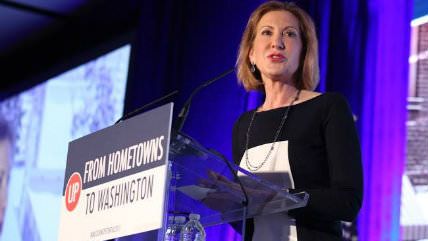Carly Fiorina Is Not the Anti-Hillary
Fiorina may thrill fans of "private enterprise," but beware.

As an advocate of a stateless society, I don't want anyone to be president. Nevertheless, someone will be chosen to live in the White House next year. Will it be a woman?
Hillary Clinton and Carly Fiorina hope so. But these two women are essentially indistinguishable from each other and from their male rivals. Style must not overshadow substance. Really, what's the point?
Clinton is a well-known champion of the all-state. To her the U.S. government is the source of order both domestic and foreign. Her fondness for social engineering is indisputable. Domestically, she likes corporatism, which comes down to bureaucrats and big business—with input from big official labor unions—running "the economy." [That's in quotation marks because an economy is just people: we're the economy the ruling elite wants to regulate.] Little is to be left to the spontaneous process that arises from peaceful social cooperation and mutual aid in the marketplace and the wider society. In foreign affairs, Clinton has a preference for military intervention. She certainly demonstrated this as secretary of state under Barack Obama. She is an enthusiast for the conceit known as "American exceptionalism."
If you need further evidence, peruse her husband's foreign-policy record, which she embraces with gusto. It was Bill Clinton who bombed and killed thousands of people in the former Yugoslavia and who devastated the Iraqis with bombs and economic sanctions. His policies in the Middle East—which included unswerving support for Israel's brutality against the Palestinians—helped set the stage for al-Qaeda's actions on 9/11, just as his domestic policies, particularly housing policy, helped to bring on the Great Recession. He also built on his predecessors' anti-Iran policy. Let's remind candidate Clinton of this whenever she invokes her husband's presidency.
How about Fiorina? If you're looking for the anti-Hillary, you'll have to look elsewhere.
Fiorina will play up the fact that she comes out of the world of (big) business. She ran Hewlett-Packard (unsuccessfully by many accounts) and held executive positions in other large companies. This may thrill fans of "private enterprise," but beware. Corporate America is no place to find advocates of freed markets, as opposed to capitalism or corporatism. When have you heard the CEO of a major company call for laissez faire—that is, the radical separation of the people and state? [Like most of her Republican rivals she opposes the Export-Import Bank. But without a more comprehensive critique of government-granted privilege, I suspect this is more a fashionable token gesture against Democratic cronyism.]
"I understand how the economy actually works. I understand the world, who's in it, how the world works," Fiorina said on ABC's Good Morning America. We've heard this rhetoric before, and it's always followed by an expansion of power. Let's not be fooled by her criticism of the "political class" and her appeal for leaders drawn from the ranks of plain citizens. From the beginning the republic has been driven largely from behind the scenes by non-politicians (mostly business and financial magnates) who had friends in high places. It helps explain (though not entirely) why key economic matters like trade—both continental and global—have always been within the government's domain and why the United States has spent so much time at war.
Fiorina sees a world full of enemies—Russia and Iran head the list—and shows no understanding that the U.S. government has gratuitously created enemies for the American people. [She's been on the CIA External Advisory Board.] At this late date she still does not know—or more likely, mind—that free markets don't coexist with an interventionist foreign policy, and she thinks the world is in turmoil because the U.S. government is not interventionist enough under Obama: "American leadership matters in the world. American strength matters in the world."
Fiorina favors "border security," indicating her belief that people must have government permission to relocate. She calls for less regulation, but unless government privileges are also eliminated, reducing regulation can bolster corporatism. Some advocate of small government!
If we must have a president, by all means, let it be a woman—but let it be a woman who understands the destructiveness of the state. Carly Fiorina is not the one.


Show Comments (114)